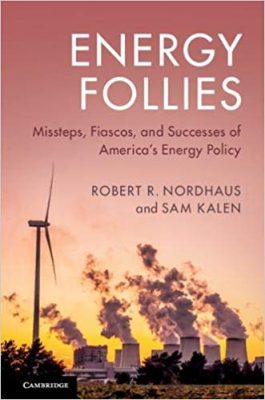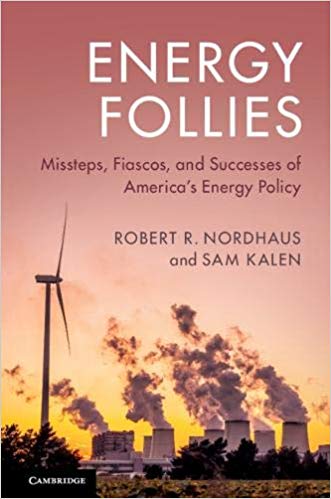 Editors: Robert R. Nordhaus and Sam Kalen
Editors: Robert R. Nordhaus and Sam Kalen
Publisher: Cambridge University Press – 245 pages
Book Review by: Sonu Chandiram
If you’re old enough, you will remember the following types of energy-related disastrous events:
- Blackouts
- Cold houses due to gas shortages
- Long lines at gas stations
- Masked people on the streets protecting themselves from breathing harmful air
- Rising carbon dioxide levels
Imagine in your mind the wheel of a bike with you the energy buyer and consumer at the center. Around you are numerous spokes going from you in the center to its rim, and the rubber tire around it that hits the road is the government-run regulatory mechanism. At the end of some of the many spokes are players in the, let’s call ‘energy game’. Among them are: greedy energy producers, recalcitrant utilities refusing to clean up their coal-fired power plants, scheming commodity traders, and vindictive Arab sheikhs.
This book is about the interplay of these actors working primarily with their own self interest in mind. The events mentioned above are the results or lack thereof of acts by these players. While here in the United States the occurrences named above happen only occasionally due to government regulations that can subject offenders and violators with stiff fines and penalties, in other countries, they happen more frequently.
Government regulations and how they are conceived, enacted into law, and executed (or not) can be helpful, but sometimes they have been harmful. The decisions upon which the regulations are based, can be faulty, and sometimes be based on, as the two coauthors characterize them, ‘folly’.
Discover what happened when those decisions were made, and what was done to rectify them, as the authors describe them in these 0 chapters:
- Introduction
- Federal Energy Regulation Begins Flowing
- The Supreme Creates a Gap
- The Gap Continues: Changing Electricity Markets
- Natural Gas’s Tortured Road from Regulation to Decontrol
- Oil Shocks, Gas Lines, and Energy Policy
- Carter Crowns Coal Kind: Coal’s War on People
- Energy Eclipsing Air
- Oil, Cars and Climate
- Embedded Judgments and Energy-Resilient Transitions
This is an insightful book on why and how mistakes were made by government officials and legislators. Louisiana’s Senator Bennett Johnson says they often made the wrong choice. It was “largely because these are political judgments, ideologically driven and ponderously arrived at without proper appreciation of the facts – or after the facts have changed.” This is good reading.
Editors:
Robert R. Nordhaus was the Federal Energy Regulatory Commission’s (FERC) first General Counsel and later served as General Counsel for the Department of Energy during the Clinton administration. From 1963 to 1974, he was Assistant Counsel in the Legislature Counsel’s Office of the US House of Representatives, where he assisted in drafting many of the nation’s prominent legislative programs, including the 1970 Clean Air Act. He was also an Adjunct faculty member at George Washington Law School and Georgetown University Law Center
Sam Kalen is the Centennial Distinguished Professor at University of Wyoming College of Law, as well as the founder and co-director of the Center for Law and Energy Resources in the Rockies at the University of Wyoming. He is the author of numerous law review articles, and the coauthor of Basic Practice Series: ESA (Endangered Species Act) published in 2012 and Natural Resources Law and Policy published in 2014.







